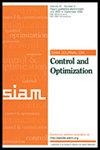正则化随机控制问题的梯度流
IF 2.4
2区 数学
Q2 AUTOMATION & CONTROL SYSTEMS
引用次数: 0
摘要
SIAM 控制与优化期刊》,第 62 卷第 4 期,第 2036-2070 页,2024 年 8 月。 摘要本文研究的随机控制问题的作用空间是概率度量,目标受相对熵的惩罚。我们确定了一个合适的度量空间,在该空间上,我们为可接受控制集合中的度量值控制过程构建了一个梯度流,保证了成本函数沿该梯度流递减。研究表明,该梯度流的任何不变度量都满足庞特里亚金最优性原理。如果我们处理的问题足够凸,梯度流的收敛速度将呈指数级增长。此外,最优度量值控制过程允许贝叶斯解释,这意味着在求解此类随机控制问题时,可以纳入先验知识。这项工作的动机是希望扩展强化学习领域广泛应用的随机梯度类型算法的收敛理论基础,以解决控制问题。本文章由计算机程序翻译,如有差异,请以英文原文为准。
Gradient Flows for Regularized Stochastic Control Problems
SIAM Journal on Control and Optimization, Volume 62, Issue 4, Page 2036-2070, August 2024.
Abstract. This paper studies stochastic control problems with the action space taken to be probability measures, with the objective penalized by the relative entropy. We identify a suitable metric space on which we construct a gradient flow for the measure-valued control process, in the set of admissible controls, along which the cost functional is guaranteed to decrease. It is shown that any invariant measure of this gradient flow satisfies the Pontryagin optimality principle. If the problem we work with is sufficiently convex, the gradient flow converges exponentially fast. Furthermore, the optimal measure-valued control process admits a Bayesian interpretation, which means that one can incorporate prior knowledge when solving such stochastic control problems. This work is motivated by a desire to extend the theoretical underpinning for the convergence of stochastic gradient type algorithms widely employed in the reinforcement learning community to solve control problems.
Abstract. This paper studies stochastic control problems with the action space taken to be probability measures, with the objective penalized by the relative entropy. We identify a suitable metric space on which we construct a gradient flow for the measure-valued control process, in the set of admissible controls, along which the cost functional is guaranteed to decrease. It is shown that any invariant measure of this gradient flow satisfies the Pontryagin optimality principle. If the problem we work with is sufficiently convex, the gradient flow converges exponentially fast. Furthermore, the optimal measure-valued control process admits a Bayesian interpretation, which means that one can incorporate prior knowledge when solving such stochastic control problems. This work is motivated by a desire to extend the theoretical underpinning for the convergence of stochastic gradient type algorithms widely employed in the reinforcement learning community to solve control problems.
求助全文
通过发布文献求助,成功后即可免费获取论文全文。
去求助
来源期刊
CiteScore
4.00
自引率
4.50%
发文量
143
审稿时长
12 months
期刊介绍:
SIAM Journal on Control and Optimization (SICON) publishes original research articles on the mathematics and applications of control theory and certain parts of optimization theory. Papers considered for publication must be significant at both the mathematical level and the level of applications or potential applications. Papers containing mostly routine mathematics or those with no discernible connection to control and systems theory or optimization will not be considered for publication. From time to time, the journal will also publish authoritative surveys of important subject areas in control theory and optimization whose level of maturity permits a clear and unified exposition.
The broad areas mentioned above are intended to encompass a wide range of mathematical techniques and scientific, engineering, economic, and industrial applications. These include stochastic and deterministic methods in control, estimation, and identification of systems; modeling and realization of complex control systems; the numerical analysis and related computational methodology of control processes and allied issues; and the development of mathematical theories and techniques that give new insights into old problems or provide the basis for further progress in control theory and optimization. Within the field of optimization, the journal focuses on the parts that are relevant to dynamic and control systems. Contributions to numerical methodology are also welcome in accordance with these aims, especially as related to large-scale problems and decomposition as well as to fundamental questions of convergence and approximation.

 求助内容:
求助内容: 应助结果提醒方式:
应助结果提醒方式:


